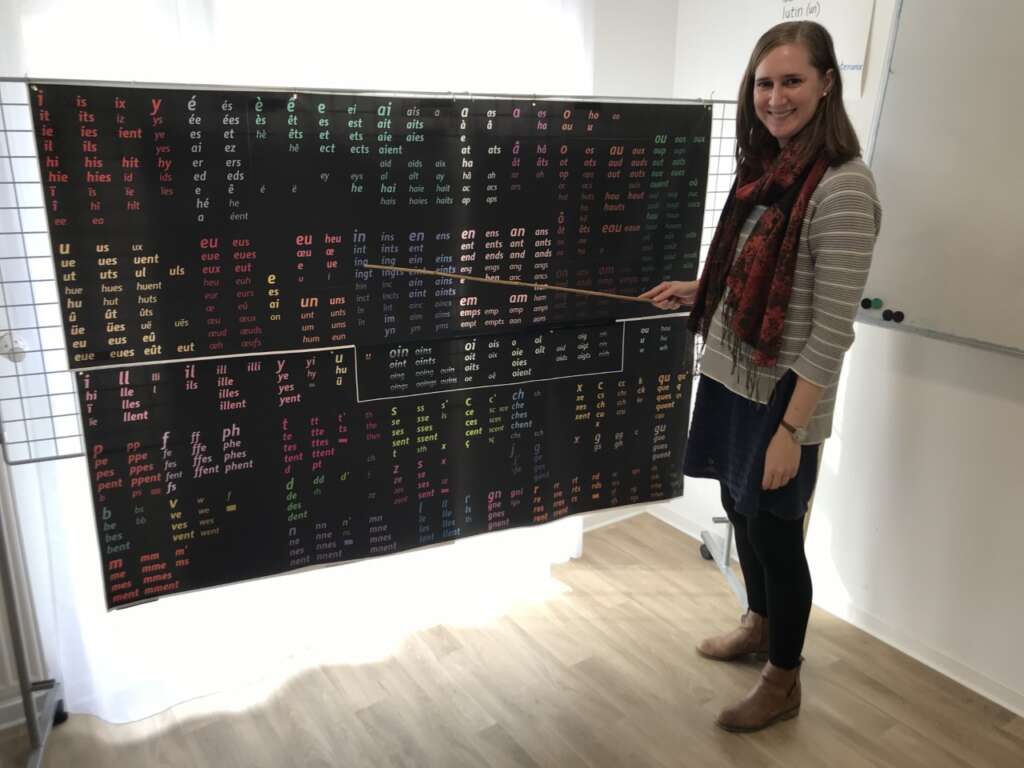Karina Brabham serves with the Church Missionary Society (CMS) in France. She’s currently at a language school near Paris. In the new year, she’ll be moving to Poitiers where she’ll be involved in encouraging and equipping university students with the gospel of Christ as a staff worker with the Groupes Bibliques Universitaires (GBU).
“Pronunciation,” says my teacher. She gets me to ‘point’ the word I’m struggling with. Taking a long bamboo stick, I point to different colours on a chart. Each colour represents a different sound. I articulate each sound that makes up the correct pronunciation of the word. Slowing things down like this means I make sure I’m moving my mouth and tongue into the right place to form each sound.
My teacher often corrects me on pronunciation like this. She says it takes time to form muscles and that’s exactly what we are doing. There are sounds in French we don’t have in English, or the way a consonant is pronounced might be different. Learning to speak another language is the slow work of building new habits. I often remind myself of the story of the tortoise and the hare – slow and steady wins the race. Learning to communicate in another culture and language is about slow perseverance.

Karina in language class
I’ve been in France for over ten months now as a new missionary and much of my time has been spent in language class. My language school’s method of teaching is interactive and focuses a lot on pronunciation and speaking. It’s also a Christian language school where many of my fellow classmates are preparing to work in ministry in the francophone world. One of the advantages of this is that we learn and practise how to communicate in a way that is relevant to what we will be doing in the future. For example, once a week, someone in my intermediate-level class will prepare a Bible study that we will do together – all in French, of course.
Today my class is spending some time in prayer. It’s the final day of the session and the last day for one of our classmates. She is moving to West Africa to work as a missionary. While what we address to God ends up only a few sentences in length each, our prayer time takes the whole morning. First, we share prayer points aloud and there are corrections to be made by our teacher or vocabulary to fine-tune. Someone has volunteered to be a scribe and write summaries of each prayer point up on the whiteboard, so sometimes we pause to review if the spelling and grammar of what she has written are correct. We divide the prayer points among us and now it’s time to pray. Our teacher records us as we haltingly speak our short prayers.
My prayers may not always be grammatically correct, but that doesn’t stop my powerful God from understanding or acting.
Our teacher plays back to us what we prayed. She pauses the recording if there’s a problem. Sometimes she’ll hold up her hands, each finger representing a word we’ve said, and get us to repeat a phrase. She’ll wiggle a finger to show where the problem is so we can try to correct it ourselves. Then she’ll get us to repeat the sentence all over again at a natural pace. We often end up saying a sentence multiple times over. This is another muscle being built – the muscles of how a French person would express an idea with the right preposition or ordering of words.
Doing this every week in language class has slowly built up my confidence in being able to pray in French. During the summer, I attended a camp for students run by the Groupes Bibliques Universitaires (GBU), the student ministry I’ll be working with long-term. It was my first taste of university ministry in French and every time we broke into small groups to pray over the week, I felt anxious about joining in. Yet the experience of praying in class reassured me that I had the basics for praying, even if it was only one or two sentences long. Then there are the reminders I give myself of who I’m praying to. My prayers may not always be grammatically correct, but that doesn’t stop my powerful God from understanding or acting.
In the slowness of learning, you can’t always see the progress you’ve already made.
Our teacher has brought the game Taboo for us to play that afternoon. In the game, you take turns describing words written on cards without saying one of the listed ‘taboo’ words, and everyone tries to guess the answer correctly. One of my classmates is nervous – she is worried that she won’t know enough vocabulary to play well. Our teacher reassures her that she can skip any words she doesn’t know and can even use the words that are on the taboo list.
It can be easy to become discouraged when you feel so far from the level of competency you are used to in your native tongue. When I’m with French people at church or a GBU Bible study, I often feel awkward in conversation or struggle to follow what someone is saying when they speak fast. I can start to doubt myself and have days where I just want to give up trying. There’s a level of perseverance required in language and culture acquisition which is often tiring. And often, in the slowness of learning, you can’t always see the progress you’ve already made.
After we’ve played Taboo, my classmate exclaims how encouraging she found the game. She was surprised by how many words she did know and could even describe in French. Which isn’t to say we get it all right. We all laugh when our teacher explains that “interrupteur” doesn’t mean someone who interrupts you (as it gets described) but is actually the French word for a light switch.
Language learning is slow but essential for why I came to France – to share the gospel with people here. It’s easy to feel weak and out of my depth as a foreigner. I’m continually reminding myself to trust in God’s sovereignty. 2 Cor 12:9 has been a favourite verse for me of late: “My grace is sufficient for you, for my power is made perfect in weakness.” In all the learning I’ve done this year, the best thing God has taught me is that the good news of the gospel is a message I keep needing to hear too.
Email This Story
Why not send this to a friend?


